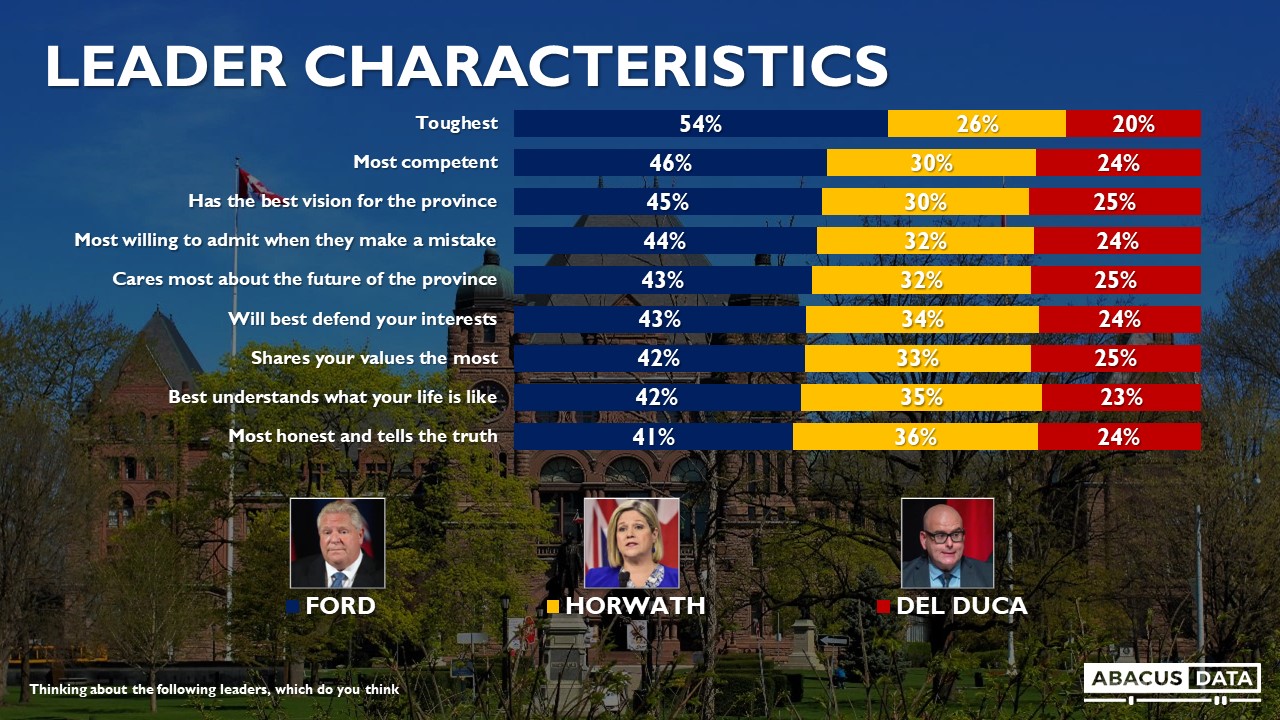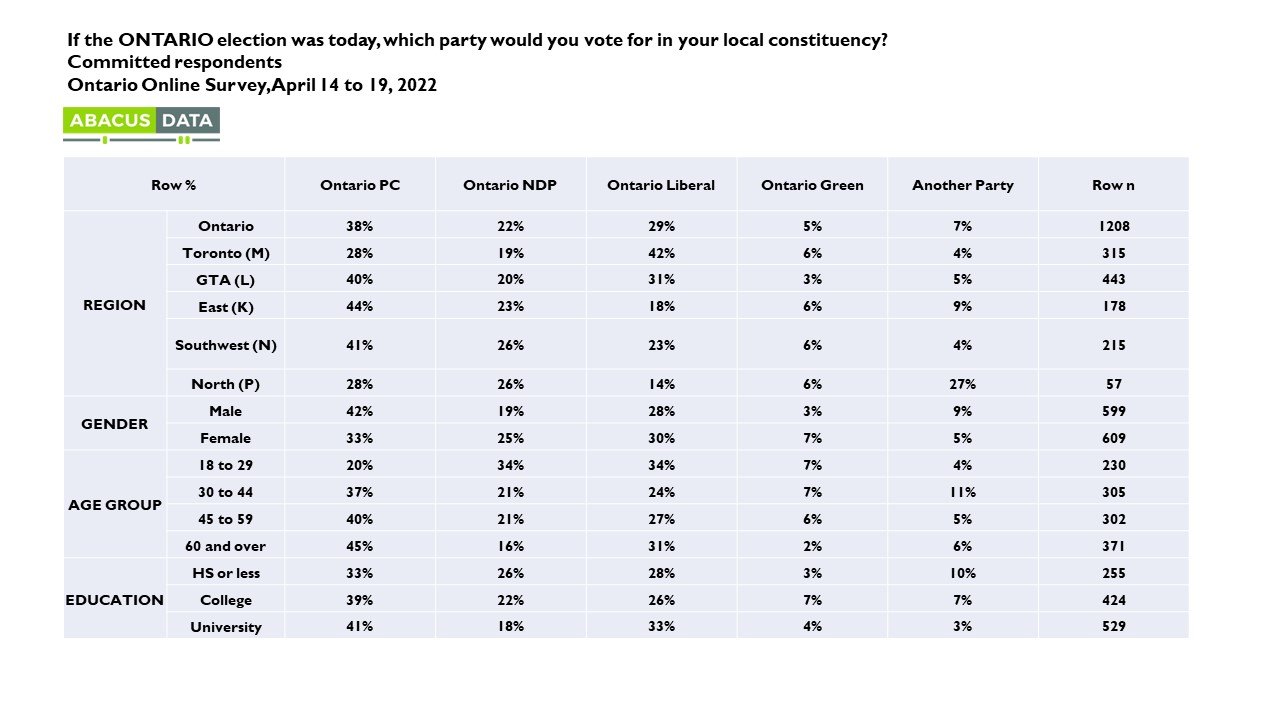Ontario PCs open up a 9-point lead: Why Doug Ford is well positioned to be re-elected.
May 11, 2022
As the Ontario provincial election started, we conducted a survey of 1,500 eligible voters in the province from May 5 to 9, 2022.
The results indicate that the Ontario PC Party is in a solid position to be re-elected in early June barring any major shifts in public opinion.
In this report, we explore the reasons for this conclusion by looking at several key indicators we will track throughout the election.
PCs LEAD BY 9 OVER THE LIBERALS. NDP AT 22%
If the election was held today, the PCs would likely win another majority government. Overall, among all committed eligible voters in our survey, the PCs have 38% of the vote with the Ontario Liberals at 29% and the Ontario NDP at 22%. The Ontario Greens are at 5% while other parties get 7% of the vote.
Since April, the PCs are up 2, the Liberals down 3, and the NDP and Greens are holding fairly steady.

Regionally, we find the PCs trailing the Liberals in Metro Toronto, but ahead by a wide margin in the GTHA (postal code starts with L), eastern Ontario, and southwestern Ontario.

The PCs also lead among eligible voters over 30 with a 14-point lead among those 60+, a 13-point lead among those aged 45 to 59, and a 13-point lead among those aged 30 to 44. Among the youngest cohort, the Liberals and NDP are tied at 34% with the PCs well back at 20%.

In our survey, 76% of respondents reported owning a car and among car owners, the PCs lead by 14-points over the Liberals. Among those who don’t own a car, the PCs trail behind in third.

The PCs also have a big lead among those who own their home. In the GTHA (including Metro Toronto), the PCs lead by 6 among those who own their home but trail the Liberals by 13 among renters. Outside of the GTHA, the PCs lead by 35-points over the Liberals.

Among those most likely to vote, the gap between the PCs and Ontario Liberals is also 9% with the PCs getting 38%, the Liberals getting 29% and 20% for the NDP.

WHAT EXPLAINS THE PC’S DOMINANT POSITION?
#1 – The desire for change isn’t high or intensive enough to seriously challenge the PCs.
Over the past few weeks, the desire for change hasn’t varied. Today, 48% definitely want to see a change in government (down 1 since April) while 19% definitely want to see the PC government re-elected. Everyone else is in the middle – either wanting change or keeping the government in power – but not caring too much about the outcome.

The desire for change in Ontario is far lower than the week before the 2018 provincial election and a little less than the final weekend of the 2021 federal election.

Perhaps most important, “change voters” – those who definitely want change – are split almost evenly between the NDP and Liberal Party in terms of vote intention.

One of two things have to happen if a PC win is going to be threatened:
(1) Change voters need to consolidate around either the Liberals or NDP. Right now neither is winning the “change” primary, or
(2) More voters need to intensely want a change in government.
Case in point, if half of “change voters” currently favouring the NDP switch to the Liberals, then they would be even with the PCs in vote intention. The same would happen if half of Liberal “change voters” switch to the NDP.
#2 – The PCs lead or are competitive on the top 5 most important issues to voters.
Reducing the cost of living remains a top issue for more than half of Ontarians (59%). Housing affordability, healthcare, taxes, and growing the economy round out the top 5.
The cost of living as a top issue is up 7-points since April while housing affordability and healthcare rose by 3-points.

When those who care about each issue are asked which party is best able to handle the issue, the PCs are ahead or competitive for all of the top 5 issues.
The PCs lead by 18 on reducing the cost of living, are in a three-way tie with the NDP and Liberals on housing affordability and healthcare, and have a massive advantage in keeping taxes from going up and growing the economy.
Unless the other parties can close this issue advantage or another issue rises to prominence over the next three weeks, the PC advantage will persist.

#3 – Doug Ford’s personal image is stronger than the other party leaders and is in a better place than it has been for much of his time as Premier.
Beyond the desire for change and issue ownership, Doug Ford’s personal image remains relatively strong.
More people have a positive view of the PC leader than any of his opponents and Mr. Ford’s negatives are lower than they have been for much of 2021 and certainly before 2020.


The anger against Doug Ford is no longer as widespread as it was in the past. About 1 in 4 have a “very negative” view of the Premier and among this group, 39% are voting Liberal while 38% will vote NDP. The split among opposition parties is a big factor explaining Ford’s lead.
In comparison to Mr. Ford, NDP leader Andrea Horwath has about equal numbers viewing her positively and negatively while Mr. Del Duca remains the least well-known leader and has more who view him negatively than do positively.
Moreover, when we ask respondents which leader is most likely to have a series of leadership traits or characteristics, Doug Ford leads on everyone. More people see him as tough, competent, having the best vision, and most willing to admit when they make a mistake. He’s also seen as the most honest.
Ms. Horwath comes second in all of these but doesn’t beat Mr. Ford in any of the attributes.

Beyond their images, when asked which leader would make the best Premier, Doug Ford easily wins, leading Ms. Horwath by 16-points and Mr. Del Duca by 19.

UPSHOT
According to David Coletto: “As the first week of the campaign ends, Doug Ford and the PCs are in the driver’s seat. The PCs have a wide lead in vote intention, have the most popular leader, and own or are competitive on the top issues on voters’ minds.
If nothing changes in the opinion environment between now and early June, the PCs should win another majority.
But the data also shows a path forward for either the NDP or the Liberals. Neither has a clear advantage among those people who deeply want to see the PCs and Doug Ford replaced. Both leaders, for different reasons, remain blank slates for millions of Ontarians who either don’t know them (Del Duca) or don’t have strong views (Horwath). Strong performances in the debates or a mistake by the PCs could create an opportunity to consolidate the anti-PC forces.
If consolidation is going to happen, it’s more likely to happen around the Liberals. Why? Well, more Ontarians say they identify with the Liberal Party (they see themselves as Liberals) than with the NDP – 27% Liberal vs. 16% NDP – and when asked who they think will win the election – far more think the Liberals will win than do the NDP.

METHODOLOGY
The survey was conducted with 1,500 eligible voters in Ontario from May 5 to 9, 2022. A random sample of panelists were invited to complete the survey from a set of partner panels based on the Lucid exchange platform. These partners are typically double opt-in survey panels, blended to manage out potential skews in the data from a single source.
The margin of error for a comparable probability-based random sample of the same size is +/- 2.1% 19 times out of 20.
The data were weighted according to census data to ensure that the sample matched Canada’s population according to age, gender, educational attainment, and region. Totals may not add up to 100 due to rounding.
This survey was paid for by Abacus Data Inc.
Abacus Data follows the CRIC Public Opinion Research Standards and Disclosure Requirements that can be found here: https://canadianresearchinsightscouncil.ca/standards/

ABOUT ABACUS DATA
We are the only research and strategy firm that helps organizations respond to the disruptive risks and opportunities in a world where demographics and technology are changing more quickly than ever.
We are an innovative, fast-growing public opinion and marketing research consultancy. We use the latest technology, sound science, and deep experience to generate top-flight research-based advice to our clients. We offer global research capacity with a strong focus on customer service, attention to detail, and exceptional value.
We were one of the most accurate pollsters conducting research during the 2021 Canadian election following up on our outstanding record in 2019.
Contact us with any questions.
Find out more about how we can help your organization by downloading our corporate profile and service offering.



